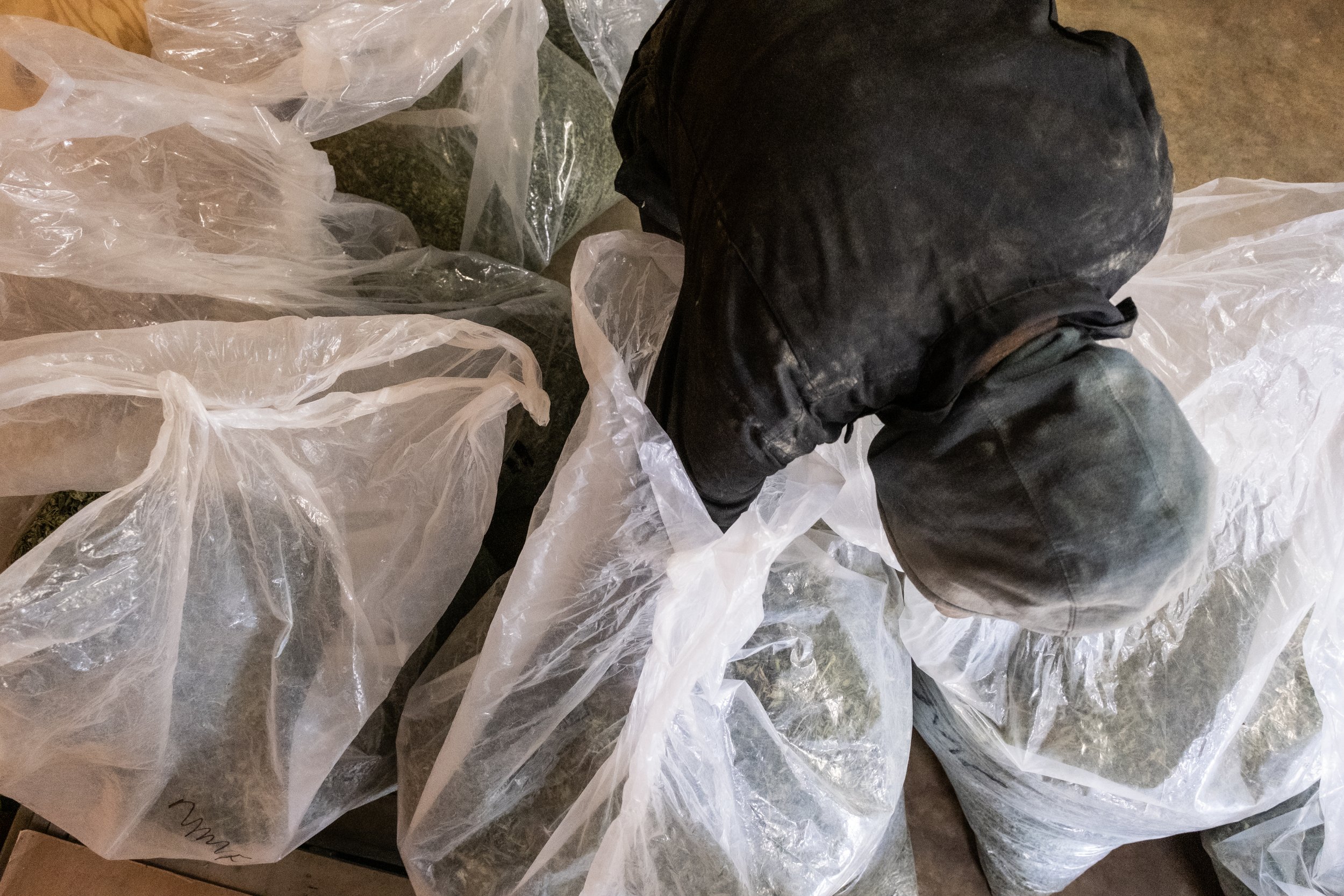
PROCUREMENT SAMPLING GUIDELINES
Powering the California Concentrate Market
FARM SAMPLING GUIDE
⦁ Please have material in bags of no more than 40 pounds per bag. No Totes please
⦁ Have all bags lined up in rows, accessible for sampling.
⦁ Have a dry covered workspace for our driver / sampling rep to work in
⦁ Have all bags open - (edge of bags rolled down if possible, 1 curled over roll is fine)
⦁ Please make sure dispatch rep has correct address information / directions to farm upon scheduling.
⦁ Please make sure that the biomass weight is 500 lbs or more.
⦁ Please leave our tags on bags and sealed once sampling is complete, untampered for quarantine, until we return for the pickup of material
DRY BIOMASS GUIDE
Mixed with Trash
EXAMPLES OF NON-USABLE MATERIAL
Wet / Damp
Oxidized Bucked Flower
Un-Bucked with Mold
EXAMPLES OF USABLE MATERIAL
Sugar leaf with Scissor Trim
Sticks/Stems
Machine Combined or Trimmer
Sugar Leaf with Trash
Kief
GOT QUESTIONS?
What if I have a light layer Mold should I still include it with my grouping?
Answer: yes, at the end of the day if you are unsure of the amount of mold content within a package, our Canna Park inspects each package before finalizing an inbound transfer, during the weight verification if a package is too heavy layered with Mold, it will be placed aside and communicated to the Procurement team of the unusable material which is then relayed to the farm.
I don’t have a moisture reader, how would I know how damp my material is?
Answer: when our Rep is sent out to collect a sample or a sample is being taken at the time of arrival to our facility, that sample gathered is sent to the testing Lab. The Results from the lab will indicate what the average moisture content is within the grouping. Our Canna Park team also conducts moisture readings on the time of weight verification. If the team encounters a damp bag it is removed from the grouping and reported back to the procurement team to relay this finding to the farm.
What should my material moisture content be?
Answer: for a grouping or individual package to be accepted at our facility; the moisture content of the material must be within 10%-11%. If the content is outside this range, terms and conditions may vary even if your material potency is testing above 12% THC.
I Have flower on the vine, will you accept that?
Answer: depending on the qty it will require for terms of payment due in 60 days. Why so long you may ask? Bucking flower off the vine is considered a project and may not be completed 1-2 weeks. Our facility is currently not set up for any cultivation processing activities so certain conditions will be implemented by our procurement team to balance all ends out.
Who pays for testing?
Answer: LEEF Labs will accommodate the first test of a grouping, if in the event a retest is needed due to a failure, then the Farm will be responsible for the testing fees.
I don’t have uniform packages, is that a problem?
Answer: not at all, our Canna Park team will communicate to the procurement team that repackaging is required to check in the load, prior this from being carried out our procurement team will reach out to the farm to get clearance and acknowledgment to repackage or consolidate the load.
I have some material I’m not sure of that could possibly be contaminated, should I include that?
Answer: no, you should always be mindful of what you are grouping together to preserve the quality of your overall grouping. Good material equals a higher pay out based on potency, but an LOQ or detect could very well kill your entire deal.
What if you find trash in my biomass?
Answer: if there is a high content of non-organic matter, the package will be automatically rejected.
BECOME A SUPPLIER
Fill out the form below and we will reach out asap.
OR CALL: 858.585.0670
CAT 4
PREPARING FOR FUTURE REGULATIONS AND CURRENT DEMANDS
Also known as the "Expanded Panel" or "Pesticide Screen Plus," CAT4 introduces 127 additional pesticides, previously screened in other states, into California's cannabis testing ecosystem.
The CAT4 movement aims to elevate California’s cannabis standards beyond current state regulations, prioritizing product safety to ensure better protection for the health and wellness of our community.
Common CAT4 Questions :
Q. What is CAT4?
A. Also known as the "Expanded Panel" or "Pesticide Screen Plus," CAT4 introduces 127 additional pesticides, previously screened in other states, into California's cannabis testing ecosystem.
Q. Why Now?
A. CAT4 was initiated following the June 14, 2024, LA Times article, "The Dirty Secret of California’s Legal Weed." Investigators tested products from California dispensaries using the standard Category 3 pesticide panel, along with this expanded panel. This article sparked a movement within the California cannabis market, pushing for higher-quality, truly organic products on the shelves—well ahead of any regulatory mandate by the Department of Cannabis Control (DCC).
Q. What Are the Limits of Detection?
A. Since the newly introduced panel is not part of California's current cannabis regulations, there is no official limit of detection (LOD). Certificates of Analysis (COAs) will only display parts per million (ppm), without identifying a pass or fail status. This means it is up to individual brands to decide what level of detection is acceptable based on their finished goods formulation.
Q. Will the CAT4 screening be present on an Exit Compliance Testing?
A. Currently, CAT4 is not part of exit compliance testing in California. The CAT4 panel is available only on Research & Development COAs.
If you have any questions, feel free to use our scheduling form above and we will get back to you asap.
OUR CAT 4 APPROACH
-
At the procurement level, we are engaging in proactive conversations with farms regarding their pest management practices and highlighting the immediate need for truly organic farming. This outreach is also part of preparing for future regulations.
-
LEEF has always maintained a rigorous procurement and sampling protocol. We have now expanded our testing of microextractions to include preliminary results for CAT4.
-
LEEF has made modifications to its extraction protocols and is now conducting single-source extractions. This means the biomass used per batch will be sourced from a single origin. In addition, LEEF remains committed to ongoing research and development to advance cannabis extraction and manufacturing for the betterment of the industry and consumers.
-
LEEF has expanded testing at the bulk oil stage to include a comprehensive COA covering CAT4 pesticides, alongside the standard CAT 1, 2, 3, and potency tests.









